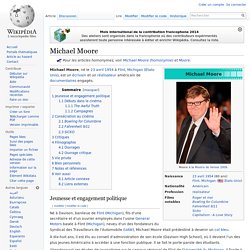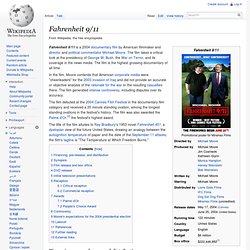

Michael Moore : EXPOSED! The lies of Michael Moore. - By Christopher Hitchens. One of the many problems with the American left, and indeed of the American left, has been its image and self-image as something rather too solemn, mirthless, herbivorous, dull, monochrome, righteous, and boring.

How many times, in my old days at The Nation magazine, did I hear wistful and semienvious ruminations? Where was the radical Firing Line show? Who will be our Rush Limbaugh? WikiLeaks and the Global Future of Free Speech. Ecuador has acted in accordance with important principles of international human rights.

Indeed, nothing could demonstrate the appropriateness of Ecuador’s action more than the British government’s threat to violate a sacrosanct principle of diplomatic relations and invade the embassy to arrest Mr. Assange. Since WikiLeaks’ founding, it has revealed the “Collateral Murder” footage that shows the seemingly indiscriminate killing of Baghdad civilians by a United States Apache attack helicopter; further fine-grained detail about the true face of the Iraq and Afghanistan wars; United States collusion with Yemen’s dictatorship to conceal our responsibility for bombing strikes there; the Obama administration’s pressure on other nations not to prosecute Bush-era officials for torture; and much more.
Predictably, the response from those who would prefer that Americans remain in the dark has been ferocious. Top elected leaders from both parties have called Mr. Mr. If Mr. Michael Moore. Un article de Wikipédia, l'encyclopédie libre.

Jeunesse et engagement politique[modifier | modifier le code] À dix-huit ans, il est élu au conseil d'administration de son école (Davison High School), où il devient l'un des plus jeunes Américains à accéder à une fonction publique. Il se fait le porte-parole des étudiants. Abandonnant ses études de journalisme sur le campus régional de Flint de l'Université du Michigan, il fonde à vingt-deux ans le Flint Voice, un journal alternatif qu'il dirige pendant dix ans.
Ses premiers engagements politiques sont à l'extrême gauche américaine. Débuts dans le cinéma[modifier | modifier le code] Michael Moore. Moore's written and cinematic works criticize globalization, large corporations, assault weapon ownership, U.S.

Presidents Bill Clinton[7] and George W. Occupy Wall Street: Michael Moore states, "We oppose the way our economy is structured" Michael Moore on support of Occupy Wall Street protest. Michael Moore (mmflint) Michael Moore's SLACKER UPRISING. Fahrenheit 9/11. Fahrenheit 9/11 is a 2004 documentary film by American filmmaker and director and political commentator Michael Moore.

Capitalism a love story. Capitalism: A Love Story is a 2009 American documentary film directed, written by and starring Michael Moore.

The film centers on the late-2000s financial crisis and the recovery stimulus, while putting forward an indictment of the current economic order in the United States and capitalism in general. Topics covered include Wall Street's "casino mentality", for-profit prisons, Goldman Sachs' influence in Washington, D.C., the poverty-level wages of many workers, the large wave of home foreclosures, corporate-owned life insurance, and the consequences of "runaway greed".[2] The film also features a religious component where Moore examines whether or not capitalism is a sin and if Jesus would be a capitalist,[3] in order to shine light on the ideological contradictions among evangelical conservatives who support free market ideals.
The film was widely released to the public in the United States and Canada on October 2, 2009. Reviews were generally positive. Sicko. Sicko is a 2007 documentary film by American filmmaker Michael Moore.

The film investigates health care in the United States, focusing on its health insurance and the pharmaceutical industry. The movie compares the for-profit, non-universal U.S. system with the non-profit universal health care systems of Canada, the United Kingdom, France and Cuba. Sicko was made on a budget of approximately $9 million,[3] and grossed $24.5 million theatrically in the United States.[4] This box office take exceeded the official expectation of The Weinstein Company, which had hoped for a gross in line with Bowling for Columbine's $21.5 million US box office gross.[5] Synopsis[edit] According to Sicko, almost fifty million Americans are uninsured while the remainder, who are covered, are often victims of insurance company fraud and red tape.
Welcome to MichaelMoore.com. Roger & Me. Synopsis[edit] Michael Moore begins by introducing himself and his family through 8 mm archival home movies; he describes himself as "kind of a strange child", the Irish American Catholic middle-class son of a General Motors employee assembling AC spark plugs.

Moore chronicles how GM had previously defined his childhood in Flint, Michigan, and how the company was the primary economic and social hub of the town. He points out that Flint is the place where the Flint Sit-Down Strike occurred, resulting in the birth of the United Auto Workers. He reveals that his heroes were the Flint natives who had escaped the life in GM's factories, including "Flint's most famous native son," game show host Bob Eubanks.